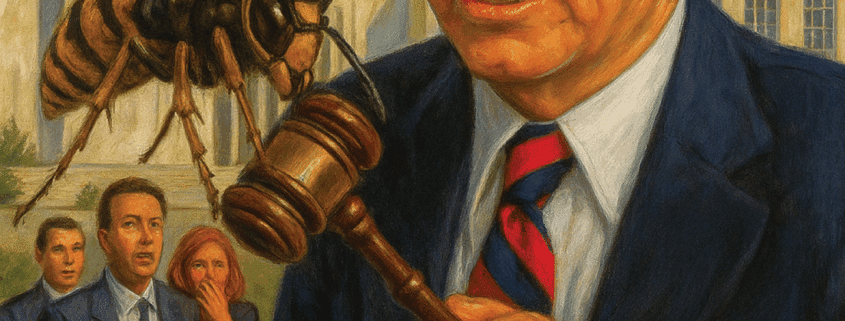The Sting of the Hornets
The Cross Pollination of the 1979 Oregon House of Representatives
The dust had finally settled on the grueling 1977 Oregon Legislative Session where a band of Blue Dog Democrats — the Six Pack — had wrestled control of the House with a coalition of Republican representatives. It was a stressful, emotionally draining time for many. Rep. Rick Gustafson, who was serving his second term, tallied nine marriages that broke up in the legislature that session.
Months later, the Six Pack was falling apart. Ted Kulongoski had left the House to accept an appointment to a vacant seat in the Senate. Dick Magruder, the founder of the political bandits, lost his re-election bid in the primary to Garland Brown. Speaker Phil Lang, who was stripped of most of his powers by the ’77 coup, was stunningly upset in the following general election. And Ed Lindquist, the House Democratic Leader who drew the ire of some of his colleagues for his early participation with the plotters, stepped down and was succeeded by Grattan Kerans as majority leader.
Portland Democrats seemed to have regained control of their caucus. The sigh of relief, however, was premature.
Two months after losing in the primary, Magruder tragically died in an accident on his farm when the tractor he was riding flipped over on him. Brown, the one who narrowly defeated Magruder in the May primary, would be alone on the November ballot because Republicans failed to file a candidate in the primary. Las Vegas oddsmakers today would have rated Brown’s chances of winning in November at 1,000-to-1.
Enter the underdog, a young law student at Willamette University named John DiLorenzo. He had served as a law clerk for Magruder, who was also an attorney, and was fascinated by both the legal and legislative process. Republicans were dismayed they had not fielded a candidate, feeling they could not have beat Magruder, who had aligned with Republicans on most rural issues anyway. They didn’t have the same affection for Brown, who they felt would align more closely with Portland liberals.
Magruder had received a number of write-ins in the Republican primary, but election law would not have allowed him to run as a Republican in the General Election since he had previously lost the primary.
DiLorenzo combed through the election law and found a possible loophole. While Magruder would not have been eligible to be the Republican nominee, the fact that votes were received for any Republican nominee meant that a vacancy had been created. Therefore, Republicans could select someone to fill that vacancy as their nominee in November.
DiLorenzo talked with Magruder’s staff and suggested district Republicans nominate Magruder’s mother Caroline as their nominee. She would secure her late son’s Democratic followers as well as Republicans and prevent Brown from turning the seat more liberal. The message went up to local party chair Kay VanNatta who liked the idea.
There was one problem: Caroline was a Democrat. No problem, said DiLorenzo.
DiLorenzo crafted a plan and took it to Greg McMurdo, the DOJ attorney representing the office of Secretary of State Norma Paulus. He pointed to the exact language in election law that said the party could nominate anyone it chooses and said nothing about having to be a member of that party.
Furthermore, the law said the candidate would appear on the ballot under the party of “which the candidate was a member.” McMurdo agreed.
DiLorenzo and McMurdo went to Paulus with the evidence and analysis and said: “Secretary Paulus, if the Republicans nominate Caroline Magruder as their nominee, and her party affiliation is Democrat, then she must be listed as Democrat on the ballot, not Republican.” It was unintended, she said, but his reading of the actual text was correct.*
In November voters went to the voting booth to select between Democrat Brown and Democrat Magruder. Magruder won with almost 60% of the vote.
* The Oregon Elections Division changed its rules in 1979 to eliminate the “DiLorenzo loophole” and would require a nominee to be a member of the political party from which they were nominated for 180 days before the nomination.
The new House Democratic caucus would have 34 members, Republicans 26. First order of business for the Democrats was to select a new Speaker as a result of Phil Lang’s upset in the General Election. Having won important procedural victories during the previous session under Magruder’s leadership, rural and suburban Democrats wanted to hold on to their hard-earned gains.
Hardy Myers, of Portland, was the Portland-area legislators’ choice to replace Lang as Speaker. The newly elected Caroline Magruder wanted to continue her late son’s work, and recruited Reps. Max Simpson of Baker, Jeff Gilmour of Linn County, and Bud Byers of Lebanon as her allies. They would become known as “The Hornets.”
“Max Simpson was a tough old bird,” recalls Tom Mason who was serving his first term in the House. “There was a lot of illusionary power bandied about.”
“It was a long, long two months of discussions in the caucus just to get ourselves organized,” remembers Rep. Jane Cease of Portland, who was about to begin her first term. “By the time the session started in January, it still wasn’t settled.”
The official Hornets may have been four, but plenty of others were buzzing about their own demands for the session.
“I remember Rep. Curt Wolfer and some of the others walking on the second floor of the chamber talking very loud about secret plans. I knew it was on purpose so I could hear them and pass them on to Rod,” remembers Billie Monroe, who served as legislative assistant to her husband, Rep. Rod Monroe.
The Hornets knew their four votes could prevent Myers from being elected Speaker. They were working closely with Republican Leader Gary Wilhelms to ensure his caucus would be in lockstep with the effort to gain concessions for rural legislators.
“If the Hornets were having so much influence, some of the women in the caucus thought we should be the ‘Queen Bees,’” Cease laughed.
The House convened the 60th Legislative Session on Monday, Jan. 8, 1979. The Battle Hymn of the Republic was sung by the Forest Grove High School choir, and the opening remarks were delivered by newly elected Gov. Victor Atiyeh. Atiyeh’s final sentence in his speech would soon appear prophetic.
“Embrace the moment. Remember it. A time like this may never come our way again,” he said.
The House convened to start business the following day. It was set for 9:30 a.m. It didn’t begin, however, until 6:10 that evening.
The Hornets were busy. When roll was called a quorum was not present. After multiple tries (and failures), the House adjourned until Wednesday. Rep. Curt Wolfer was in the Chair and freshman Rep. John Kitzhaber called the roll. All members were present. Rep. Joyce Cohen nominated Rep. Hardy Myers as Speaker. He received 30 votes, one shy of the majority needed. Time and again the vote remained the same.
The Hornets and their Republican colleagues were demanding a greater role in committee assignments and chair and vice-chair authorities. They were also upset that the Co-Chair of Ways & Means, Rep. Vera Katz of Portland, was seemingly giving away the store to Portland-area interests while short-changing the needs of rural communities during the previous session.
They demanded that Myers, if he wanted to be Speaker, remove Katz from the powerful appropriations committee and replace her with one of the Hornets, Rep. Jeff Gilmour, a farmer representing Linn and Marion counties.
“Hell would freeze over before I could do that,” Myers is said to have retorted.
Two days later, on Friday, Jan. 12, after a day and evening of negotiations, hell froze over.
The midnight hour was approaching. Katz would step aside as Co-Chair of Ways & Means and the gavel placed in the hands of Gilmour. He also got agreement that he could have a spittoon by his desk during the session. It is unclear which he relished more.
The House reconvened at 1:40 a.m. It was now Saturday. Members wiped the sleepiness from their eyes and cast yet another vote for Speaker. Hardy Myers 34 votes, Wilhelms 26.
Magruder, Simpson, Byers, and Gilmour were the only ones to take the politically dangerous votes, but once the outcome was secured it seemed as if half the Democratic caucus claimed they were proud members of The Hornets.
“To his credit, Hardy supported the idea of a more inclusive role for the minority,” Wilhelms said. “The rules changes proved to have a significant impact on the results. We couldn’t pass anything on our own, but we were able to stop bad legislation from passing.”
Among the accomplishments engineered by Wilhelms and Myers was a major tax reform package that reduced property taxes by as much as 30%, give a rebate to taxpayers, and created the now famous (or infamous, depending on your perspective) Kicker Law. It passed with wide bipartisan support 54-6.
Unlike the previous session there were few fires that leadership had to put out. *
* Well, actually, there was one.
John Kitzhaber recalls Democratic Rep. Wally Priestly of Portland, known for “living off the food in the House Lounge,” also had a penchant for sleeping in the lounge or his legislative office rather than paying for an apartment like other legislators. Priestly often cooked his food on a hot plate in his office.
“One night he either fell asleep or got distracted and the hot plate caught fire, triggering the fire alarms in the Capitol wing,” Kitzhaber said.
Embarrassment was the only damage recorded.
Political observers generally praised the cooperative tenor of the session.
In an editorial near the close of session on June 23, 1979, the Oregonian newspaper wrote:
“The roles of Myers and Wilhelms in the delicate process deserve special applause as the Salem players prepare to take their bows when the legislative curtain falls.”
In the 46 years since, there has never again been another Six Pack or Band of Hornets. Rural communities, for the most part, no longer see Democrats as allies. Urban communities, likewise, cannot identify with the current Republican Party. Political cross pollination is increasingly rare.
But the roadmap is still there, tucked away in the archives, waiting to be dusted off by any willing to take the risk of disruption of current party politics and “fly with their own wings.”



